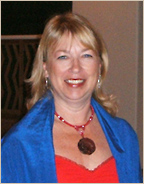Other than logistical things with the upcoming training, I had the day off. I went to church with my friend Eva. Going to worship services in different countries is one of the greatest cultural things one can do when visiting another country, in my opinion. Eva’s church is a series of HUGE tents and there are three different simultaneous services—one for adults, one for youth and one for children. The service was almost 3 hours long, but extremely interesting. Next Sunday Eva’s choir does a holiday presentation so I’m really looking forward to that.
Some of us did an afternoon shopping trip to the Masai Market. A woman I purchased items from in August 2007 saw me and came up to me. I was so surprised that she remembered me. I was looking for her as well. You can check out my website at www.UpFromTheDust.com in the next couple of weeks and we’ll highlight the “bone jewelry” that I buy from her. It sold out quickly the last time I got it!
Phyllis Mwangi and her husband joined the Vital Voices team, Eva and her daughters and myself for dinner. We got into a very interesting discussion about the Women’s Business Forum’s advocacy training that Eva conducted on Friday (see Kenya Day 1 blog). Or—I’ll save you the trouble and remind you of one thing that I wrote:
Advocating for “economic” issues has never been discussed before, they said. Advocacy here is generally about human rights so the idea of economic empowerment and advocacy is a first.
One of the presenters, Betty Murungi, Director of the Urgent Action Fund in Nairobi, talked about the importance of businesswomen to stay involved with the human rights advocacy as well. We had a great discussion about this at dinner. I mentioned that based on my experience with WIPP, I thought it might be important for the Women’s Business Forum (WBF) to make sure they focus on business and economic issues.
This created a lot of discussion about how violence against women, gender discrimination and overall human rights violations are an economic issue. If an entire generation is dying of AIDS, where are we are business owners going to find our employees? If women are beaten and battered by their husbands, they can’t go to work and that affects the economy. If girls are married off at age 15—or lower—society is potentially missing years and years of economic contribution from that girl.
Melysa Sperber from Vital Voices, a lawyer who has experience representing human rights’ victims, cited a US Supreme Court decision that upheld a lower court ruling which declared that violence against women is even an interstate commerce issue.
Again, as I said earlier, I am active with Women Impacting Public Policy (WIPP), which represents more than 500,000 women business owners on Capital Hill. WIPP has more than 30 women business groups as coalition partners. However, you will not see WIPP take an issue on a breast cancer bill, for example. WIPP only responds to issues that relate to small business or women-owned business, not to women’s issues.
Part of the strategy behind that is to keep a focus. Part of its policy statement reads “Matters which are not directly relevant to the economic health and well-being of constituent businesses are not part of our agenda.”
So, the scourge of AIDS on society does affect a business, but maybe that can be covered by making sure that businesses can afford to provide health care benefits? This is just one example. But the Supreme Court decision also shows the impact on human rights issues when businesses get involved or commerce is affected. So if more businesses and business associations got involved with human rights issues, would we move more quickly in these areas?
One suggestion I made is that for a group like the WBF, maybe economics is the umbrella and the human rights issues are visibly mentioned under that umbrella. That begs the question that should human rights issues be treated as second-rate issues—or is that how it would be perceived?
This discussion can go around and around. Will WBF, especially since it is just beginning, be less effective if they don’t keep a focus? Another great suggestion was—are any of the 30+ coalition partners in WIPP groups that are predominantly advocating for human rights issues, women’s health care issues, etc.? If not, maybe those groups need to do more to reach out and work together with business groups and add the economic impact of their issues to the forefront of their advocacy!
We continued this discussion on Monday with the NIKE Foundation representatives, because their programs really look at the economic empowerment of adolescent girls because overall, that helps increase the living situations of the girls, their families and their communities…..So again, does economics lead the human rights issue, or vice versa? More on the NIKE Foundation program later this week as we get into the training.
I encourage readers of this blog to respond to this discussion—what do you think?
Monday, December 1, 2008
Subscribe to:
Post Comments (Atom)


No comments:
Post a Comment